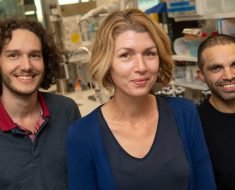
Genetic studies spanning three generations of a Persian Jewish family by researchers at Ben-Gurion University of the Negev (BGU) have identified a gene that causes nighttime atrial fibrillation (AFib).
“AFib is a type of arrhythmia or abnormal/irregular heart rhythm,” says Prof. Amos Katz, cardiologist and dean of the BGU Faculty of Health Sciences (FOHS). “It occurs when electrical impulses fire off from different places in the atria, the top two chambers of the heart, in a disorganized way. Arrhythmia can cause stroke or heart failure, although it is not immediately life-threatening.”
Based on their findings, the research team at the BGU National Institute for Biotechnology in the Negev (NIBN) and the FOHS is now developing a new anti-arrhythmia medication.
Prof. Katz initially treated the family’s grandmother for nighttime AFib and later diagnosed some of her children and grandchildren as young as age 20 with a similar condition. AFib typically afflicts people older than 60.
The predominantly nighttime AFib was shown, for the first time, to be caused by a mutation in a gene (KCND2), involving a component of a potassium ion channel (Kv4.2) in the heart. Ion channels are protein molecules that span across the cell membrane allowing the passage of ions from one side of the membrane to the other.
“Combining genetic studies with frog oocyte and mouse analyses, our research group demonstrated that the mutation increases conductivity of the channel, thus greatly enhancing predilection to AFib,” says Prof. Ohad Birk, M.D., Ph.D., of the BGU Morris Kahn Laboratory of Human Genetics at NIBN, where the gene was discovered. “This ion channel is unique in that it is expressed specifically in the cardiac atria, and has circadian rhythm, which explains why the mutation causes AFib specifically at night.”
Source: Read Full Article





